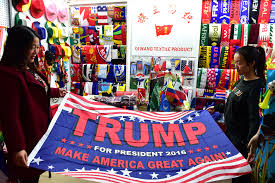
U.S.-China Trade Deadlock Impacts Global Shares

Ongoing trade conflicts between the world’s two biggest economies U.S. and China has put a noticeable impact on investors’ risk appetite as the Global stocks are sliding downwards at the beginning of the week itself.
The stocks in Germany and France pulled down the Stoxx Europe 600 which was already by 0.4% in early European trade That followed a downbeat session in Asia.
S&P 500 and Dow Jones Industrial Average can face future opening losses of 0.5% and 0.6% each.
Regarding this Trade deadlock tariffs of 25% on approximately $50 billion of Chinese goods were approved by President Donald Trump on Friday to encourage Chinese officials to strike back by announcing the same rate on U.S. goods of the same value.
Such a trade conflict between the two biggest economies of the world have become a priority concern amongst the investors, because these actions by such economies in past few months has not only resulted in rising frictions in international trade but has also led to instability and uncertainty in global markets, which are experiencing f their most unstable stretches in years.
Sources said that most of the investors are pretty much anxious about the upcoming future of the North American Free Trade Agreement and tariffs that the Trump administration imposed on European allies.
“Trade continues to weigh on the market and the China tariffs are a big deal,” said Lindsey Bell, investment strategist at CFRA Research. “It could get worse before it gets better.”, the government official said.
Majority of the market watchers and shareholders still wishes and prays for the good terms between the two biggest economies of the world and they should continue talking with each other. Regarding the trade deadlock impact, the Analysts at Deutsche Bank estimated the impact of the announced U.S. tariffs by President Donald Trump on China’s economy which came out to be less than 0.1% of

China’s gross domestic product. If the U.S. will keep on announcing such tariffs as Mr Trump has already threatened China with then the impact would surely rise to 0.3%.
Sources even revealed that after the last week’s meeting between the Federal Reserve and the European Central Bank, investors are presently looking towards central bankers for further guidance on monetary policies.
On asking about personal views regarding such a trade conflict between the two countries, sources shared that this is not a wise action in terms of future prospects as such actions of these economies has not affected the business but also investors in the market.